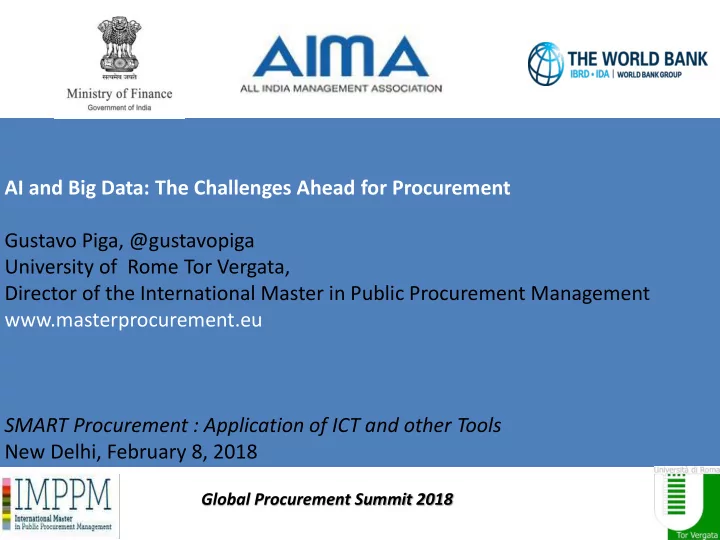

AI and Big Data: The Challenges Ahead for Procurement Gustavo Piga, @gustavopiga University of Rome Tor Vergata, Director of the International Master in Public Procurement Management www.masterprocurement.eu SMART Procurement : Application of ICT and other Tools New Delhi, February 8, 2018 Global Procurement Summit 2018
How distant is the distant future? 2
The future? Better postponed? 3
Don't panic! $249 'BabelFish' Pilot earphones can translate foreign languages in real-time The future? Now 4
The future procurer 5
The trend THE GROWING IMPORTANCE OF SOCIAL SKILLS IN THE LABOR MARKET David J. Deming 6
�In a much discussed paper, Frey and Osborne (2013) estimate that 47 percent of total U.S. employment is at high risk of automation over the next one to two decades , suggesting that even highly skilled workers may eventually lose the �Race Against the Machine�. In this paper, I show that high-paying, difficult-to- automate jobs increasingly require social skills . Nearly all job growth since 1980 has been in occupations that are relatively social skill-intensive . Jobs that require high levels of analytical and mathematical reasoning but low levels of social interaction have fared especially poorly. The Race against Why are social skills so important in the modern labor the Machine market? The reason is that computers are still very poor at simulating human interaction. Reading the minds of others and reacting is an unconscious process, and skill in social settings has evolved in humans over thousands of years . Human interaction in the workplace involves team production, with workers playing off of each other’s strengths and adapting flexibly to changing circumstances. I relate the growing importance of social skills to advances in information and communication technology (ICT) that have shifted the organization of work toward flexible and self-managed team structures, job rotation and worker multitasking .� 7
Social dominance THE GROWING IMPORTANCE OF SOCIAL SKILLS IN THE LABOR MARKET David J. Deming 8
Where is the Procurer? THE GROWING IMPORTANCE OF SOCIAL SKILLS IN THE LABOR MARKET David J. Deming 9
The table below ranks 772 occupations according to their probability of computerisation (from least- to most- computerisable). 146. 0.03 Purchasing Managers 272. 0.29 Wholesale and Retail Buyers* Procurers 458. 0.77 Purchasing Agents** 715. 0.98 Procurement Clerks *Except Farm Products **Except Wholesale, Retail, and Farm Products THE FUTURE OF EMPLOYMENT: HOW SUSCEPTIBLE ARE JOBS TO COMPUTERISATION? Carl Benedikt Frey and Michael A. Osborne 10
Standardized procurement is NOT here to stay: let it go ; Complex procurement WILL stay: let it grow ; How? More competences, more Conclusion? accountability, more discretion, more data , less waste, more resources (and away from lowest price). PS: more centralization with more ICT? Not necessarily. See South Korea that centralizes information and not tenders, with SME-friendly policies. 11
Big Data or No Data? 12
New world: good or bad? Governance matters for data impact 13
MIGHT NOTHING CHANGE? FROZEN DATA Data might be available but no �handyman�: the role of competence Does data availability improve society or does society improve data availability? Data are often hidden (Bandiera, Prat and Valletti, AER) or incomplete (see many many database) What might make data release and availability more palatable ? See later. What could go wrong? MIGHT THINGS GET WORSE? BURNING DATA • Sure! Imagine a journalist getting a hold of data that show that procurer A bought an item at a lower price than procurer B. How many will blame procurer B? • Civil society ? Analysis of the use of the word «corruption» in social networks points to partisan use of it, not investigative or analytical. • What might prevent the wrong use of data? • Competence and selectivity in data user? 14
Bandiera, Valletti, Prat on waste : The «integrity» issue with data Data are key for waste in procurement HOW MUCH PUBLIC MONEY IS WASTED, AND WHY? EVIDENCE FROM A CHANGE IN PROCUREMENT LAW Oriana Bandiera, Andrea Prat, Tommaso Valletti, American Economic Review 15
Bandiera, Valletti, Prat on waste : «Integrity» «X% of waste is due to corruption (1-X)% to and… inefficiencies». 16
Bandiera, Valletti, Prat: Data in procurement «17% of waste is due to corruption, 83% to identify inefficiency». « thieves» only? Integrity? Framing effect 17
Data are tales. Tales are narrative, stories, fables: Powerful! Negativity Bias exist: it is easier to remember bad things Data (see Trip Advisor) Confirmation Bias exist: I look for I what I want to find Lack of Trust through Bandwagon effects exist 18
One datum on corruption might entail belief that system is corrupt Trust, the vicious Lack of Trust in Procurement circle More rules, more risk-aversion, less innovation, less data, less accountability, more waste, less resources. No trust 19
• If procurement system is based on trust and accountability: why not data management? • Why not exalt best practices through tales based on data? Alternative Governance? • Why not engage the Public Administration even more Risk- than civil society? More competent! Management? Trust • If benchmarking, why not benchmarking with respect to one’s own (past) data and not with respect to others (cfr. OECD-WB Maps)? More precisely accountable, less stressful, more rewarding, more incentives! Would this allow for greater openness and data availability? 20
One (dozen) data on competence and excellence might entail belief that system is competent Trust Trust, the virtuous circle Discretion with accountability through data , better spend management, innovation, resources, careers for complex procurement with no incentive to quit Trust and no corruption 21
Recommend
More recommend